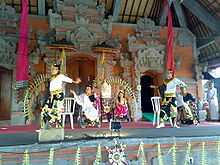Wheelchair DanceSport
 Senang Hati-Diah Larasati-Wheelchair Dance | |
| Highest governing body | World DanceSport Federation WDSF |
|---|---|
| First played | 1968 Sweden |
| Characteristics | |
| Contact | yes |
| Team members | single competitors, doubles, or teams |
| Mixed gender | yes |
| Type | indoor |
| Equipment | Wheelchair |
| Venue | dance hall |
| Presence | |
| Country or region | worldwide |
| Paralympic | 1998[1] |
Wheelchair DanceSport is a partner dance competition and Dancesport where at least one of the dancers is in a wheelchair.
Sport
Wheelchair couple dances are for two wheelchair users or for one wheelchair user with a "standing" partner and include standard dances such as waltz, tango, Viennese waltz, slow foxtrot and quickstep and Latin American dances such as samba, cha-cha-cha, rumba, paso doble and jive. There are also formation dances for four, six or eight dancers.[2]
Wheelchair dancing started in Sweden in 1968, originally for recreation or rehabilitation, with the first competition held in 1975. The first international competition was also held in Sweden, in 1977. Several regional and international competitions followed and the first World Championship was held in Japan in 1998. Since 1998, Wheelchair Dance Sport is governed by the International Paralympic Wheelchair Dance Sport Committee (IPWDSC), although it is not part of the paralympic program. The sport incorporates the rules of the World DanceSport Federation (WDSF).[2]
Championships
Classification
- Combi: dancing with an able-bodied (standing) partner
- Duo: dance for two wheelchair users together
- Formation: dances for four, six or eight couples dancing in formation
athletes are placed into one of two classes:[3]
- LWD 1: 14 points or less
- LWD 2: more than 14 points
European Championships
| 1991 | München | Germany[4] | |
| 1993 | Oslo | Norway | |
| 1995 | Duisburg | Germany | |
| 1997 | Härnösand | Sweden | |
| 1999 | Athens | Greece | |
| 2001 | Arnhem | Netherlands | |
| 2003 | Minsk | Belarus | |
| 2005 | No Championship | ... | |
| 2007 | Warsaw | Poland | |
| ...... | 2009 | Tel Aviv | Israel |
| ...... | 2011 | No Championship | ... |
World Championships
| 1998 | Nagano | Japan | |
| 2000 | Oslo | Norway | |
| 2002 | Warsaw | Poland | |
| 2004 | Tokyo | Japan | |
| 2006 | Papendahl | Netherlands | |
| 2008 | Minsk[5] | Belarus | |
| ...... | 2010 | Hannover | Germany |
| ...... | 2012 | No Championship | ... |
Social
Wheelchair dancing is a popular social and recreational activity, with participants in over 40 countries.[6] The physical benefits of wheelchair dancing include the maintenance of physical balance, flexibility, range of motion, coordination and improved respiratory control. The psychological effects of ballroom dancing are social interaction and the development of relationships. For social dancers, it is an opportunity to engage in a fun and a friendly event with others. For competitors, it assists in the development of fair play, sportsmanship and communication skills. Wheelchair dancing is an activity that integrates the wheelchair user and able-bodied person.[7]
In 2012, the Palo Alto Veterans Hospital in California, lead by researcher Minna Hong, conducted a study on American DanceWheels Foundation's trademarked and copyrighted syllabus and the program's effectiveness on the physical and psychological health of people with disabilities. The program lasted only 6 weeks, and the benefits to participants were extraordinary. Results cited a reduction in weight and resting pain, as well as improved strength, range of motion, reaction time, speed, wheelchair skills, and coordination. Community participation increased and adherence was very high.
Courses
In February, 2008 the University of Delaware Collegiate DanceWheels Program was created to instruct students in wheelchair dancing. This is the first accredited course of its kind in the United States. The program was developed in conjunction with the American DanceWheels Foundation through a grant from the Christopher and Dana Reeve Foundation.[8]
See also
| Wikimedia Commons has media related to Wheelchair dance. |
American DanceWheels Foundation
References
- ↑ "Wheelchair Dance Sport". International Paralympic Committee. Retrieved 30 October 2011.
- ↑ 2.0 2.1 "About the Sport". IPC Wheelchair Dance Sport. International Paralympic Committee. Retrieved 30 October 2011.
- ↑ Classification
- ↑ Chronik Rollstuhltanzsport 1973-2003 (TU München) (german) 21 November 2011
- ↑ Championships
- ↑ Rogers, Avery (12 November 2001). "Wheelchair Dancing". ExploreDance.com. Retrieved 6 November 2011.
- ↑ Goldberg, Kenny (21 June 2011). "Wheelchair Dancing Is On A Roll". KPBS. Retrieved 6 November 2011.
- ↑ Buck, Crystal (29 January 2008). "UD to offer nation’s first wheelchair dance course". UDaily. University of Delaware. Retrieved 30 October 2011. Includes a picture of a dancing couple.
External links
- Official website IPC- Wheelchair Dancesport